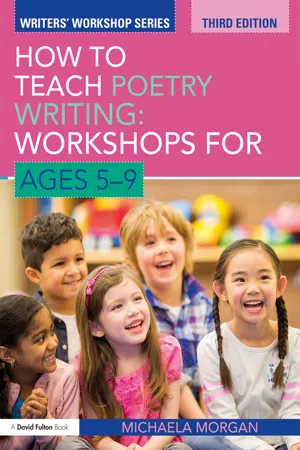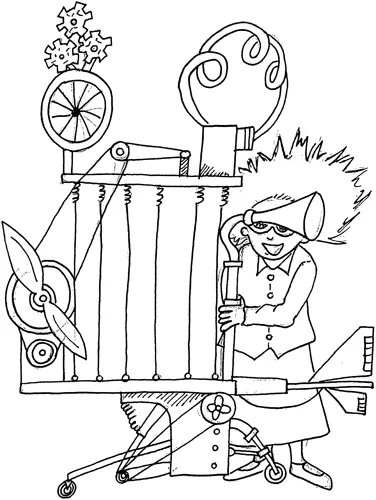
This is a test
- 98 pages
- English
- ePUB (mobile friendly)
- Available on iOS & Android
eBook - ePub
How to Teach Poetry Writing: Workshops for Ages 5-9
Book details
Book preview
Table of contents
Citations
About This Book
Now in a fully revised third edition, How to Teach Poetry Writing: Workshops for Ages 5–9 is a practical, activity-based resource of poetry writing workshops. Each workshop provides enjoyable activities for pupils, aimed at building enjoyment and understanding of what poetry is and how to write it. Aiming to encourage speaking and listening skills as well as developing writing, this book includes:
- new workshops and a new emphasis on cross-curricular links;
- spelling, punctuation and grammar approached in an enjoyable and memorable way via poetry;
- redrafting and revising activities;
- poetry writing frames;
- traditional and contemporary poems from diverse cultures;
- children's own poems on their favourite subjects;
- performance poetry;
- word games, nonsense and invented words;
- an A to Z guide to poetry, providing terminology, examples and a fund of further lesson ideas;
- a very extensive bibliography to encourage further reading and reading for enjoyment.
This book provides teachers with a wealth of material and the inspiration to create a class of enthusiastic and skilled readers, writers and listeners.
Frequently asked questions
At the moment all of our mobile-responsive ePub books are available to download via the app. Most of our PDFs are also available to download and we're working on making the final remaining ones downloadable now. Learn more here.
Both plans give you full access to the library and all of Perlego’s features. The only differences are the price and subscription period: With the annual plan you’ll save around 30% compared to 12 months on the monthly plan.
We are an online textbook subscription service, where you can get access to an entire online library for less than the price of a single book per month. With over 1 million books across 1000+ topics, we’ve got you covered! Learn more here.
Look out for the read-aloud symbol on your next book to see if you can listen to it. The read-aloud tool reads text aloud for you, highlighting the text as it is being read. You can pause it, speed it up and slow it down. Learn more here.
Yes, you can access How to Teach Poetry Writing: Workshops for Ages 5-9 by Michaela Morgan in PDF and/or ePUB format, as well as other popular books in Éducation & Éducation générale. We have over one million books available in our catalogue for you to explore.
Information
Workshop 1: Rhyme Time
Nursery and modern rhymes
Chants
Nonsense words
Speaking and listening
- Enjoy saying the rhymes. Say one or several of the rhymes out aloud. Children can join in with the words.
- Ask children if they are familiar with any of these rhymes or if they know other rhymes. They may know rhymes from other cultures and languages.
They may know different versions of these rhymes. You may notice that in the Eenie Meenie rhyme I have used the less offensive option of ‘Catch a tiger by its toe’. There is no definitive version of any of these rhymes; they vary from district to district, country to country, and time to time. Many contemporary children may not have played with these rhymes at all but they may know television jingles. Accept advertising jingles as a modernday version of playground chant if offered. Scribe extra rhymes that the children already know. If some rhymes they suggest display questionable attitudes, use them as an opportunity to discuss the subject that arises and raise awareness.
You will find many more traditional rhymes in the famous Opie collections (see Bibliography). These rhymes are folk rhymes that have been used by generations of children for making choices or counting-out. Their nonsense qualities seem to make them magical to children. Gathering these from the children makes the point that they already know a lot of poetry. Children can make it up. It is playful.
- Play with rhyme. Take a rhyming family word (e.g. hop) and ask children to come up with rhyming words. Feel free to make up nonsense words that just emphasise the sound. This can be a help with phonics as well as being fun.
- Collect counting-out rhymes, playground rhymes etc. by asking children which ones they know. Do their parents or grandparents know any?
- Make a recording or performance of them. A film of skipping and dipping rhymes in action would be fun to make. A filmed performance can be put on the school website or on the e-safe Perform a Poem website, or it can be shown to the school in assembly.
- Try to get rhymes from different cultures and other languages (there are some examples in the Bibliography, but it may be that the children or their friends and relatives can come up with their own.)
Reading and writing
- Write out a favourite rhyme on a large piece of paper, pointing to the words as everyone joins in.
- Read Each Peach Pear Plum by Allan and Janet Ahlberg. This picture-book uses the traditional rhyme as its starting point. You could find more traditional/street rhymes in the Opie collection (see Bibliography) and could extend one of these in a similar way.
Further work and cross-curricular links
- Use a counting-out rhyme as an aid to choosing children for a particular task, leaving the classroom for break etc. Use them in PE or at playtime.
- Make a collection of traditional rhymes.
- E-mail other schools in other parts of the country or in other countries to add to the collection.
- Take the first lines of some traditional chants that may not be known by the children and see if you can invent extra lines orally – nonsense is fine! Here are some to start with:
- Inky pinky ponky … [e.g. My daddy had a donkey]
- Etum peetum penny pie …
- Ickle ockle bluebottle …
- Ip dip …
- For further reading, enjoyment and inspiration, look at other contemporary and some classic poems which feature nonsense. Examples: Spike Milligan’s On the Ning Nang Nong, Lewis Carroll’s Jabberwocky or Edward Lear’s Jumblies.
- Use this frame to make up a class rhyme:
- Run and hop,
- ________________________________________.
- Jump and skip,
- ________________________________________.
- One, two, three,
- ________________________________________.
Action time
Mrs Sprockett’s Strange Machine
Mrs Sprockett has a strange machine.
It will thrill you through and through.
It’s got wheels and springs and seven strings
And this is what they do.
Pull string number one . . .
. . . it begins to hum mmmmmmmmmmmmmm
Pull string number two . . .
. . . it goes Cock-a-Doodle Doo.
Pull string number three . . .
. . . it will buzz like a bee zzzzzzzzzzzzzzz
Pull string number four . . .
. . . it will start to rrrrRRoarrrrrr.
Pull string number five . . .
. . . it will dip and dive.
Pull string number six . . .
. . . it will play silly tricks.
Pull string number seven . . .
. . . it will fly up to heaven.

(Michaela Morgan)
Mrs Sprockett has a strange machine.
It will thrill you through and through.
It’s got wheels and springs and seven strings
And . . . I WISH I HAD ONE TOO!
Workshop 2: Action Time
Action verse
Predictable structure and patterned language
Substituting and extending patterns
Joining in
Performing
Learning by heart
Speaking and listening
- Display t...
Table of contents
- Cover
- Half-Title
- Series
- Title
- Copyright
- Contents
- Acknowledgements
- A Note from the Author
- Introduction: Writers’ Workshop
- Almost Everything You Ever Wanted to Know about Poetry: A to Z
- Workshop 1: Rhyme Time – enjoying traditional rhyme
- Workshop 2: Action Time – action poetry
- Workshop 3: Pussycat, Pussycat – nursery rhymes
- Workshop 4: Can You Do the Kangaroo? – ‘nonsense’ words
- Workshop 5: Mrs Brown – extending a pattern, rhyming
- Workshop 6: All Join In – onomatopoeia
- Workshop 7: Monster Meals – alliteration
- Workshop 8: Chips – a cut-up poem, or a shape/concrete poem
- Workshop 9: The Robin – writing a non-rhyming poem
- Workshop 10: The Poem Hunt – using the senses, writing poetic sentences, making revisions
- Workshop 11: Feelings – using similes, expressing emotion
- Workshop 12: Word Hoard – collecting interesting words
- Workshop 13: Playing Around – word play, tongue-twisters, riddles, puns
- Workshop 14: Licensed to Thrill – performing poetry
- Workshop 15: The Jumblies – narrative poetry
- Workshop 16: Bags of Spag
- Display Frames
- Bibliography